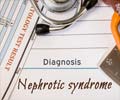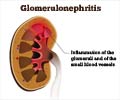Q: Which doctor should I consult in case of Glomerulonephritis?
A: A Nephrologist should be consulted or a physician with special interest in kidney diseases.
Q: I have been told I have early kidney failure. What does this mean? What can I expect?
A: This means that your kidneys are not doing as good a job as they should to help keep you healthy. Your kidneys normally remove waste products and extra fluid from your blood. These waste products and fluids come from the foods you eat and liquids you drink. If you have early kidney failure, some of the waste products and extra fluid remain in your blood.
Sometimes, early kidney failure may progress to total kidney failure. However, if you follow your doctor's orders carefully, you may be able to slow down this process.
Q: How can a special diet help?
A: A special diet can help to control the buildup of waste products and fluid in your blood and to decrease the workload of your kidneys.
This diet may also help to slow down the loss of kidney function. The main goal of the diet is to keep you healthy.
Your doctor may recommend a special diet, depending on the stage of your disease. If and when this diet is ordered for you, your doctor may want you to see a renal dietitian, who has special training in diet for kidney disease.
Q: What if I am diabetic?
A: In some cases, you may need to make only a few changes in your diabetic diet to fit your needs as a kidney patient. If your doctor suggests that you eat less protein, you must be sure to get enough calories from other sources.
Q: What are Calories & its implication on Kidney disease?
A: In general, the diet used for the early stages of kidney disease controls the amount of protein and phosphorus you eat. Usually, sodium is also controlled. Getting enough calories to maintain a healthy weight is very important at this time.
Calories:
Calories give you energy. Because you are getting fewer calories from protein, you will need to get more calories from other foods. Your dietitian may recommend that you get these extra calories from sugar and vegetable fats to help you get the right amount of calories.
Avoid losing too much weight because it can cause malnutrition and lead to illness.
Some ways to increase calories are as follows:
Increase unsaturated fats such as vegetable oils (made with corn, cottonseed, safflower, soybean or sunflower oils), olive oil and mayonnaise type salad dressings.
Use sugar or sweets such as hard candy, gum drops, jelly beans, marshmallows, honey, jam and jelly.
Use canned or frozen fruits in heavy syrup.
If you are diabetic or overweight, talk with your renal dietitian about the best way for you to get the right amount of calories for your needs.
Q: What will happen if I don't follow this diet?
A: Your special diet may help to slow the loss of kidney function and to protect you from malnutrition. In later stages of kidney disease, the diet may also help you control the amount of waste products in your blood. If these waste products build up to very high levels, they may cause nausea, vomiting, hiccups, tiredness, weakness, sleepiness and other disorders.
Q: Will my diet change over time?
A: Your diet may change as your kidney function changes. In the early stages of your kidney disease, your diet may be reduced in protein. If dialysis or a kidney transplant is needed, your diet will change based on the treatment option you choose.
Q: Will I have to take vitamins and minerals?
A: Vitamins and minerals come from a variety of foods you eat each day. If your diet is limited, you may need to take special vitamins or minerals. Take only the vitamins and minerals your doctor orders for you. Certain vitamins may be harmful to people with kidney disease.
Q: What if I am a vegetarian?
A: Vegetarian diets by nature are high in potassium and phosphorus because of all the vegetables, whole grains and fruits that make up the diet. A vegetarian diet that includes eggs and milk is easier to work into the renal diet. The goal is to eat the right combinations of plant proteins while keeping potassium and phosphorus under control.
Q: Can diet help prevent the bone disease seen in many kidney patients?
A: Yes. Calcium and phosphorus are two minerals important for healthy bones. Diseased kidneys are unable to remove phosphorus from the blood as well as they should. Too much phosphorus in your blood may lead to loss of calcium from your bones. This may cause your bones to become weak and to break easily.
As mentioned earlier, phosphorus comes from many foods in your diet. By eating fewer high phosphorus foods, you reduce the amount of phosphorus in your blood, which reduces calcium loss from your bones. Your doctor may order a medicine called a phosphorus binder to keep your body from absorbing phosphorus from foods. This medicine should be taken with your meals and snacks as your doctor orders.










